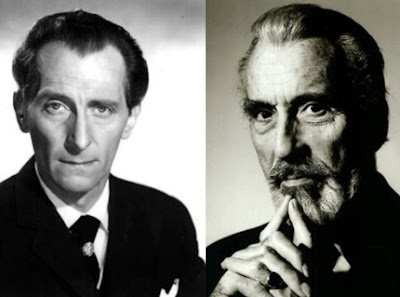 The Birthday Party is one of the "off the beaten path" films Amicus did in the late 60's. It really isn't a horrror film at all, but more of a psychological thinking man's film. It was based on the play written by Harold Pinter, who died Wednesday at the age of 78. Here's the news straight from Yahoo!:
The Birthday Party is one of the "off the beaten path" films Amicus did in the late 60's. It really isn't a horrror film at all, but more of a psychological thinking man's film. It was based on the play written by Harold Pinter, who died Wednesday at the age of 78. Here's the news straight from Yahoo!:
"British Nobel laureate Harold Pinter -- who produced some of his generation's most influential dramas and later became a staunch critic of the U.S.-led war in Iraq -- has died, his widow said Thursday. He was 78. Pinter died Wednesday after a long battle with cancer, according to his second wife Antonia Fraser. In recent years he had seized the platform offered by his 2005 Nobel Literature prize to denounce President George W. Bush, former British Prime Minister Tony Blair and the war in Iraq. But he was best known for exposing the complexities of the emotional battlefield. His writing featured cool, menacing pauses in dialogue that reflected his characters' deep emotional struggles and spawned a new adjective found in several dictionaries: "Pinter-esque." "Pinter restored theater to its basic elements: an enclosed space and unpredictable dialogue, where people are at the mercy of each other and pretense crumbles," the Nobel Academy said. "With a minimum of plot, drama emerges from the power struggle and hide-and-seek of interlocution." His characters' internal fears and longings, their guilt and difficult sexual drives were set against the neat lives they constructed in order to try to survive. Usually enclosed in one room, the acts usually illustrated the characters' lives as a sort of grim game with actions that often contradicted words. Gradually, the layers were peeled back. "How can you write a happy play?" he once said. "Drama is about conflict and degrees of perturbation, disarray. I've never been able to write a happy play, but I've been able to enjoy a happy life." Pinter wrote 32 plays; one novel, "The Dwarfs," in 1990; and put his hand to 22 screenplays. The working-class milieu of his first dramas reflected his early life as the son of a Jewish tailor from London's East End. Born Oct. 30, 1930, in the London neighborhood of Hackney, he was forced along with other children during World War II to evacuate to rural Cornwall in 1939. He was 14 before he returned. By then, he was entranced with Franz Kafka and Ernest Hemingway. By 1950, Pinter had begun to publish poetry and appeared on stage as an actor. Pinter began to write for the stage, and published "The Room" in 1957. A year later, his first major play, "The Birthday Party" was produced in the West End. In it, intruders enter the retreat of Stanley, a young man who is hiding from childhood guilt. He becomes violent, telling them, "You stink of sin, you contaminate womankind." The play closed after just one week to disastrous reviews, but Pinter continued to write and was most prolific between 1957 and 1965. "With his earliest work, he stood alone in British theater up against the bewilderment and incomprehension of critics, the audience and writers, too," British playwright Tom Stoppard said when the Nobel Prize was announced. "I find critics on the whole a pretty unnecessary bunch of people," Pinter once said. In "The Caretaker," (1959) a manipulative old man threatens the relationship of two brothers, while "The Homecoming" (1964) explores the hidden rage and confused sexuality of an all-male household by inserting a woman. In "Silence" and "Landscape," (1967 and 1968) Pinter moved from exploring the underbelly of human life to showing the simultaneous levels of fantasy and reality that occupy the individual. "The speech we hear is an indication of that which we don't hear," Pinter once said. "It is a necessary avoidance, a violent, sly, and anguished or mocking smoke screen which keeps the other in its true place. When true silence falls we are left with echo but are nearer nakedness." "Betrayal" (1978) was reportedly based on the disintegration of his marriage to actress Vivien Merchant, who appeared in many of his first plays."The movie was brought to the screen by legendary director William Friedkin, who would bring such groundbreaking films to the screen as The French Connection and The Exorcist. The actual screenplay for the movie was written by Harold Pinter and starred such classic actors as Robert Shaw (Jaws, The Deep, From Russia with Love) and Amicus supporting regular Patrick Magee (The Monster Club, ...And Now the Screaming Starts!, Asylum, Tales from the Crypt, The Skull).


 Since Amicus released two movies based on the EC Comics, we felt that this was news fans would want to know. Here it is straight from Variety:
Since Amicus released two movies based on the EC Comics, we felt that this was news fans would want to know. Here it is straight from Variety:















































